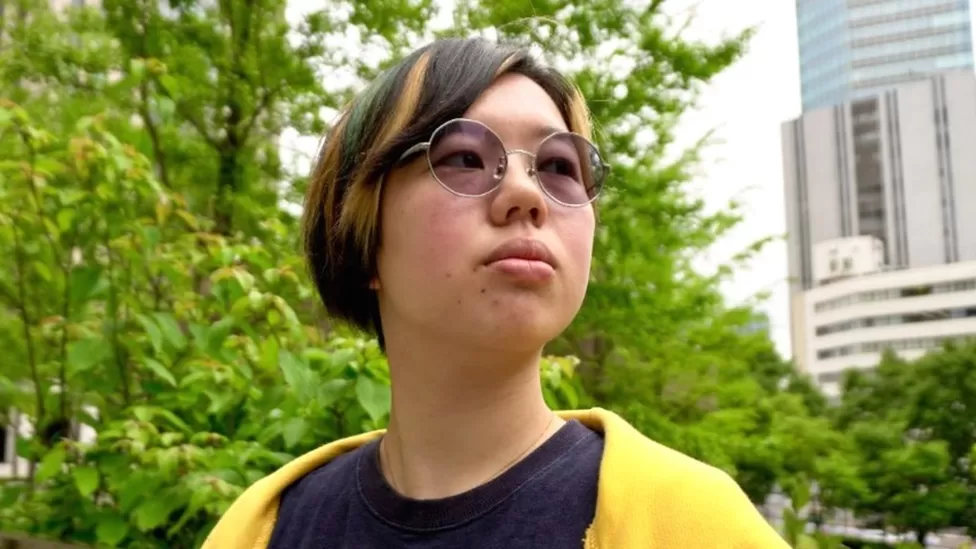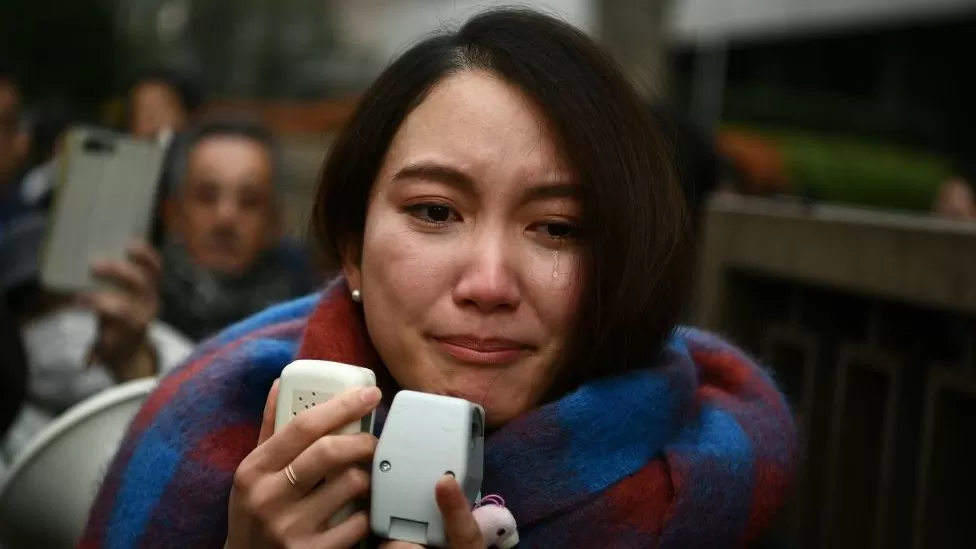“Rape” in the “Western” sense of the word is not even real at all.
The only actual rape is some black guy grabbing a woman off the street, and even in that situation, you have to ask why the woman was walking through a black area alone at night.
BBC:
Warning: this article contains details that some readers may find distressing.
Days after their rape, Megumi Okano says, they already knew the attacker would get away scot-free.
Megumi, who uses they as a personal pronoun, knew the man who did it, and where to find him. But Megumi also knew there would be no case, because Japanese authorities were not likely to consider what happened as rape.
So the university student decided not to report the incident to the police.

Wanna bet her “rape” was as real as her pronouns?
“As I couldn’t pursue [justice] that way, he got to live a free and easy life. It is painful to me,” Megumi says.
But change may be coming. The Japanese parliament is now debating a landmark bill to reform the country’s sexual assault laws, only the second such revision in a century.
The bill covers a number of changes, but the biggest and most significant one will see lawmakers redefine rape from “forcible sexual intercourse” to “non-consensual sexual intercourse” – effectively making legal room for consent in a society where the concept is still poorly understood.
NO ONE UNDERSTANDS “CONSENT.”
PEOPLE WHO SAY THEY UNDERSTAND IT ARE LYING OR CONFUSED.
I HAVE TRIED TO UNDERSTAND IT. I’VE TRIED REALLY HARD. IT IS AMORPHOUS, AND SLIPS THROUGH YOUR HANDS LIKE GOOP IF YOU TRY TO PIN IT DOWN.
“FORCE” EXISTS AND CAN BE DEFINED.
“CONSENT” IS NOT A REAL THING.
Current Japanese law defines rape as sexual intercourse or indecent acts committed “forcibly” and “through assault or intimidation”, or by taking advantage of a person’s “unconscious state or inability to resist”.
This is at odds with many other countries which define it more broadly as any non-consensual intercourse or sexual act – where no means no.
Alternative title: how to have sex with a woman and still be a faggot
Activists argue that Japan’s narrow definition has led to even narrower interpretations of the law by prosecutors and judges, setting an impossibly high bar for justice and fostering a culture of scepticism that deters survivors from reporting their attacks.
In a 2014 Tokyo case, for instance, a man had pinned a 15-year-old girl to a wall and had sex with her while she resisted. He was acquitted of rape as the court ruled his actions did not make it “extremely difficult” for her to resist. The teenager was treated as an adult because the age of consent in Japan is only 13 years – the lowest among the world’s richest democracies.
“The actual trial processes and decisions vary – some defendants were not convicted even if their acts were proven to be non-consensual, as they did not meet the case of ‘assault or intimidation’,” says Yuu Tadokoro, a spokesman for Spring, a sexual assault survivor group.
It’s why Megumi says they did not go to the police after the assault by a fellow university student.
According to Megumi, the two of them were watching TV together when he began making sexual advances towards Megumi, who said “No”.
Then, he attacked. The two “wrestled” for a while, says Megumi, before Megumi froze and gave up resisting. This well-documented response to an attack is sometimes not covered by the current law, according to activists.
In the days afterwards Megumi – a law student – pored through the penal code and case precedents and realised what had happened would not meet court standards of “assault and intimidation”.
They had also heard of survivors experiencing victim blaming and “second rape” – where survivors are re-traumatised when encountering insensitivity from the police or hospital staff – in Japanese investigations.
“I did not want to go through that process [of an investigation] for my scarce hope of getting justice. That’s why I didn’t go to the police. I wasn’t even sure whether my report would be accepted,” they say.
Instead, Megumi says, they went to the university’s harassment counselling centre, which launched an investigation and ruled the attacker had committed rape.
When approached by the BBC, the centre refused to comment on the case, citing confidentiality.
By the time the investigation concluded, the attacker had graduated – so he suffered little consequences apart from receiving a warning, says Megumi. “I felt disappointed that I could not make this person properly regret his action through criminal procedure.”
A clamour for change
Megumi is not alone. In Japan only a third of cases recognised as rape result in prosecutions, slightly lower than the general criminal prosecution rate.
But there has been a growing public clamour for change.
In 2019, the Japanese public was enraged when a series of four sexual assault cases, each resulting in the acquittal of the alleged attacker, emerged within a month.
In one case in Fukuoka, a man had sex with a woman who’d passed out drunk – which could be considered as sexual assault in other places. The court heard the woman took part for the first time at a regular drinking session at a restaurant.
According to reports, the man said he thought “men could easily engage in sexual behaviour” at the event, which was known for its sexual permissiveness, and others who witnessed the incident did not stop him. He also assumed the woman gave consent because at one point during intercourse she had opened her eyes and “uttered noises”.
In another case in Nagoya, where a father had sex with his teenage daughter repeatedly over many years, the court doubted he had “completely dominated” his daughter because she went against her parents’ wishes in picking a school to attend, even though a psychiatrist testified she was generally psychologically incapable of resisting her father.
Following the public outcry, most of these cases were re-tried and the attackers were found guilty. A nationwide campaign, known as the Flower Demo, was launched by activists to show solidarity with sexual assault survivors.
Activists say this, along with the burgeoning #MeToo movement and journalist Shiori Ito’s landmark victory, helped to spur the national conversation on sexual assault and moved the needle on legal reform.
As part of the redefinition of rape, the new law explicitly sets out eight scenarios where it is difficult for the victim to “form, express, or fulfil an intention not to consent”.
They include situations where the victim is intoxicated with alcohol or drugs; or subject to violence or threats; or is “frightened or astonished”. Another scenario appears to describe an abuse of power, where the victim is “worried” they would face disadvantages if they do not comply.
The age of consent will also rise to 16 years, and the statute of limitations will be extended.
Some rights groups have called for more clarity on the scenarios, saying they are too ambiguously worded. They also fear that they make it more difficult for prosecutors to prove the charges. Others have said the statute of limitations should be extended even further, and that there should be more protection for survivors who are minors.
Nevertheless, if passed, the reforms would mark a victory for those who have long lobbied for change.
“The very fact that they are changing even the title of this law, we are hoping that people will start this conversation in Japan on: What is consent? What does non-consent mean?” says Kazuko Ito, vice-president of the Tokyo-based Human Rights Now
But time is running out. The upper house of the Diet, Japan’s parliament, must pass the new law by 21 June, but it is currently embroiled in a debate over immigration.
…
But the reforms address only one part of the problem, say activists, whose call for change stretches well beyond the courtroom.
Sexual assault is still a taboo subject in Japan and has gained national attention only in recent years in the wake of high-profile cases such as Shiori Ito’s court battle, former member of the Self Defence Force and sexual assault survivor Rina Gonoi’s public statements, and the Johnny Kitagawa expose.
Part of the problem, Kazuko Ito says, is that generations of Japanese have grown up with “a distorted idea of sex and sexual consent”.
On the one hand, sex education is usually taught in a veiled and modest way, and consent is hardly touched upon.
And yet, Ms Ito says, Japanese children have easy access to porn where an all too common trope is of a woman enjoying having sex against her will.
Japan should offer more financial and psychological support for sexual assault survivors, says lawyer and rights advocate Sakura Kamitani.
But the attackers should also receive help, she adds. “Sex crimes have such a high recidivism rate, we must focus on prevention, otherwise there would be more and more victims.”
…
Megumi says they would consider reporting their attack to the police if the law changes – but not immediately.
“I kind of succeeded in settling my feelings already. I think it is too hard to put myself into that serious position of the ‘first penguin’,” they say, using a Japanese term for the first person to take the plunge into something new.
Instead Megumi, who identifies as gender-fluid, is focusing on campaigning for sexual assault survivors and sexual minority rights, and hopes to start a law firm to help these groups.
“I am relieved that I now see some hope. Many are starting to realise that the current situation we are in is distorted and wrong.
“I believe things are going to change faster and more significantly than we think, if everyone joins in and works together. My message [to everyone] is: ‘If you think something is wrong, let’s change it together.'”
How much is Japan willing to sacrifice to be a part of the failing Western order?
The West is asking – or rather demanding – everything from them.
They have to put themselves in a position to get bombed into oblivion by the Chinese, and they have to sacrifice all of their ancient social norms.
What is China asking for?
Nothing.
China has opened up to free trade with Japan.
The whole issue that Japan had all these wars with China over was that previous emperors had demanded tribute to do trade, and the Japs say they pay tribute to no one. Or they used to say that. Now they do whatever Creepy Uncle Sam tells them to do like little yipping dogs.
Anyway – Emperor Xi doesn’t request tribute. He’s doing free trade.
They could make a deal if they wanted to.
But they just keep doing what the US tells them to do.
 Daily Stormer The Most Censored Publication in History
Daily Stormer The Most Censored Publication in History



